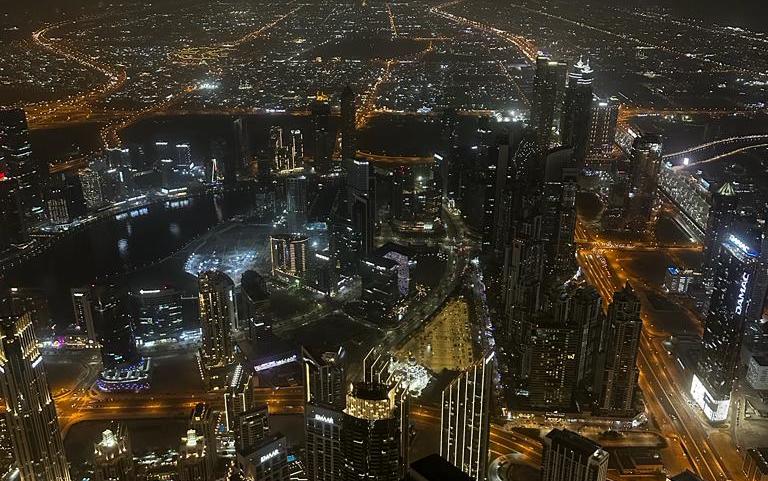While in Dubai, it is impossible to resist a visit to the Burj Khalifa’s highest floors, at least those open to the public. Surveying with mocktail or coffee in hand, the glimmering skyscrapers, roads, and lights from the famous lounge on levels 152–4, is certainly an experience. It puts into perspective not just the superhuman creation of Dubai as a thoroughly modern megalopolis, but how the very ideals of modernity have helped the United Arab Emirates to outline a new approach to cultural and religious diversity unlike any other major power in the Arab world.
The Louvre Abu Dhabi, founded in 2007 and established in 2017, pioneered a museum experience centered on the universal nature of human creativity and culture. Just two years later in 2019, the UAE government, led by PM Mohammed bin Rashid Al Maktoum, inaugurated the Year of Tolerance. This was the country’s first explicit articulation of how a modern Islamic society approaches an increasingly pluralistic context. In particular, the UAE’s economic jewel of Dubai, from its exquisite culinary scene to its powerhouse engine of hospitality and tourism, requires a fine balance of adherence to Islamic norms with a light touch system that allows for private flourishing.
The universal experience, for Sheikh Mohammed, needs to demonstrate sensitivity toward the public forum and the private dwelling, and also toward diverse interests in a traditional society.
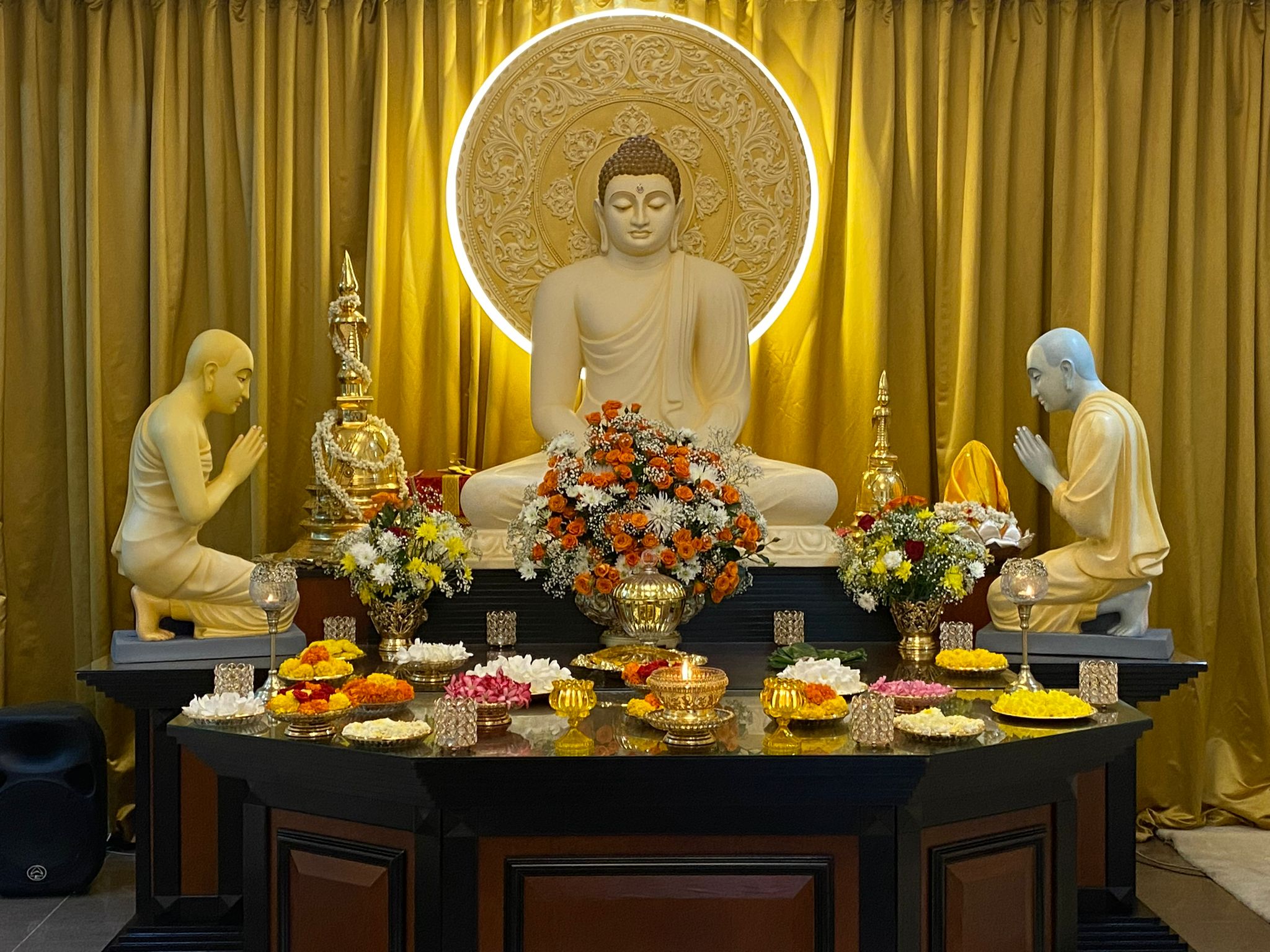
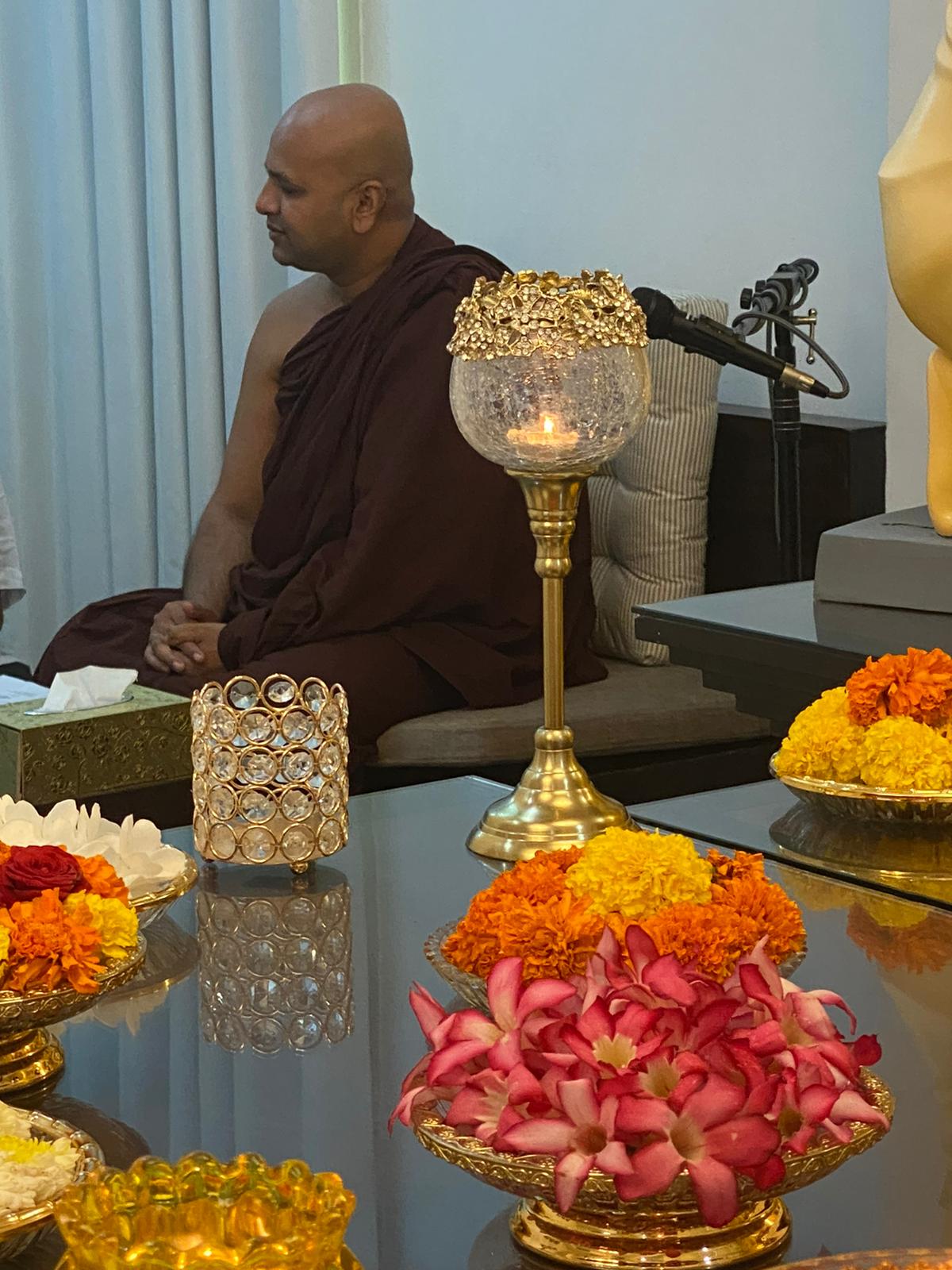
Private flourishing is especially important in the context of practicing non-Islamic religions. For two unrelated monasteries that I visited during my few days in the UAE, Mahamevnawa and Lankaramaya, the sheik’s recent approach to balancing the country’s diverse populations has been extremely welcome and empowering. I spoke with both monasteries’ abbots about how the government’s strategy is paying dividends for the multicultural fabric of communities living and working in the country.
In the morning, I went to Lankaramaya Monastery in the famous commercial-residential zone of Garhoud. When I arrived, volunteers and devotees were just finishing up Buddha Wandanawa (devotional rites) for the first half of the day. The current abbot, a gentle and soft-spoken man who initially practiced at the famous aranya (forest monastery) of Nā Uyana, said that there have been two monks residing permanently at Lankaramaya since 2018, assisting with rituals and Dhamma teachings. Since its opening in 2015, Lankaramaya has been serving predominantly Sri Lankan expatriates, from blue collar workers to white collar professionals. But the abbot also emphasized that there were devotees from Vietnam, Nepal, Bangladesh, and China coming to practice their home faith.
“Every Saturday we have two hours of meditation, and every Sunday, we have full meditation from eight in the morning to four in the afternoon, along with evening activities,” he said. Expatriate populations famously work hard and can experience a great deal of stress and excitement alike in a city that makes one feel at the center of the world. Meditation helps to take the stress out of their busy lifestyles.
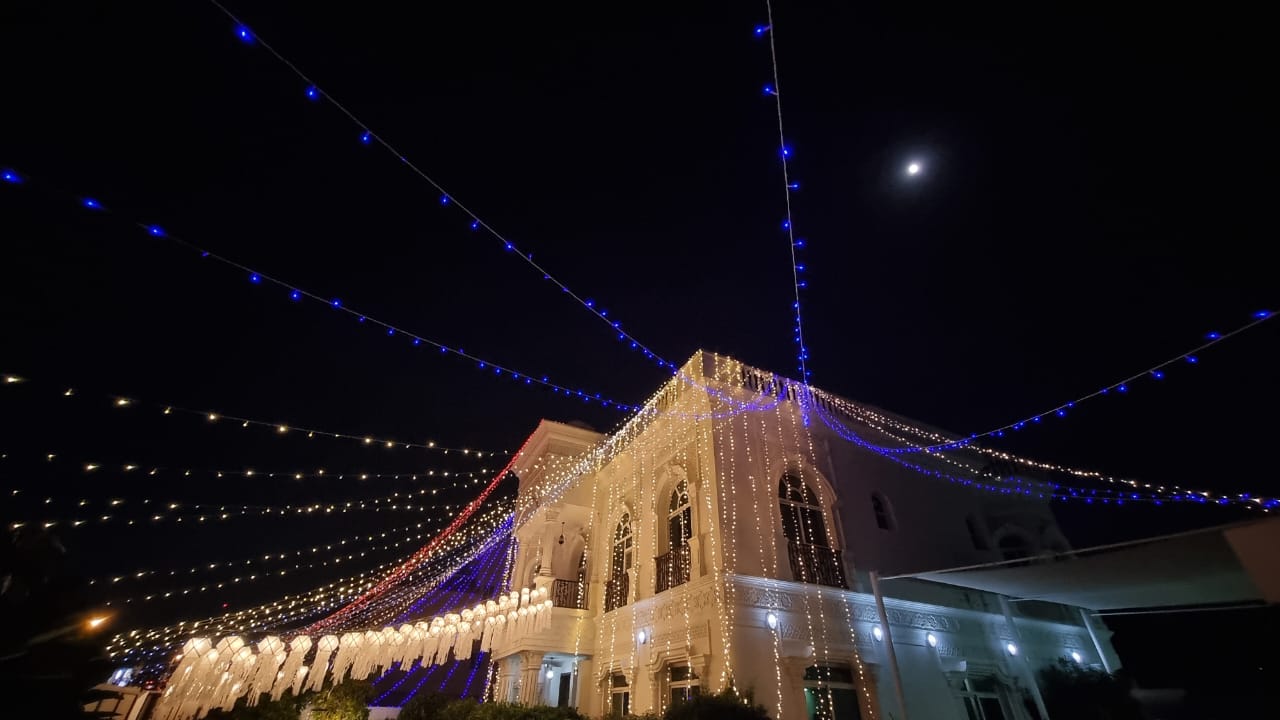
As a religious community, Lankaramaya met the challenge of the pandemic with resolve and mindfulness, using Zoom for religious services. With so many Dubai-based Sri Lankans unable to travel home for loved ones’ funerals, Lankaramaya’s monks held the last rites by Zoom. This allowed the traditional procedures and funerary rituals like alms giving to proceed during the COVID period.
After lunch, I visited the Middle East’s inaugural Buddhist institution: Mahamevnawa Monastery in the leafy and upper-class neighborhood of Jumeirah 1. An eloquent and direct preacher, Ven. Muditha Vihari Thero leads the monastery and, more broadly, represents the Mahamevnawa Buddhist Monastery organization in the UAE. The Sri Lanka-based group was founded by Kiribathgoda Gnanananda Thero in 1999, but rapidly grew into a global collective of over 40 branches. The Dubai branch was founded in 2010 as the first Buddhist monastery in the UAE, with abbots arriving and departing based on Mahamevnawa’s system of rotating managers. The idea is to keep monks from growing attached to being permanently rooted in any given community.
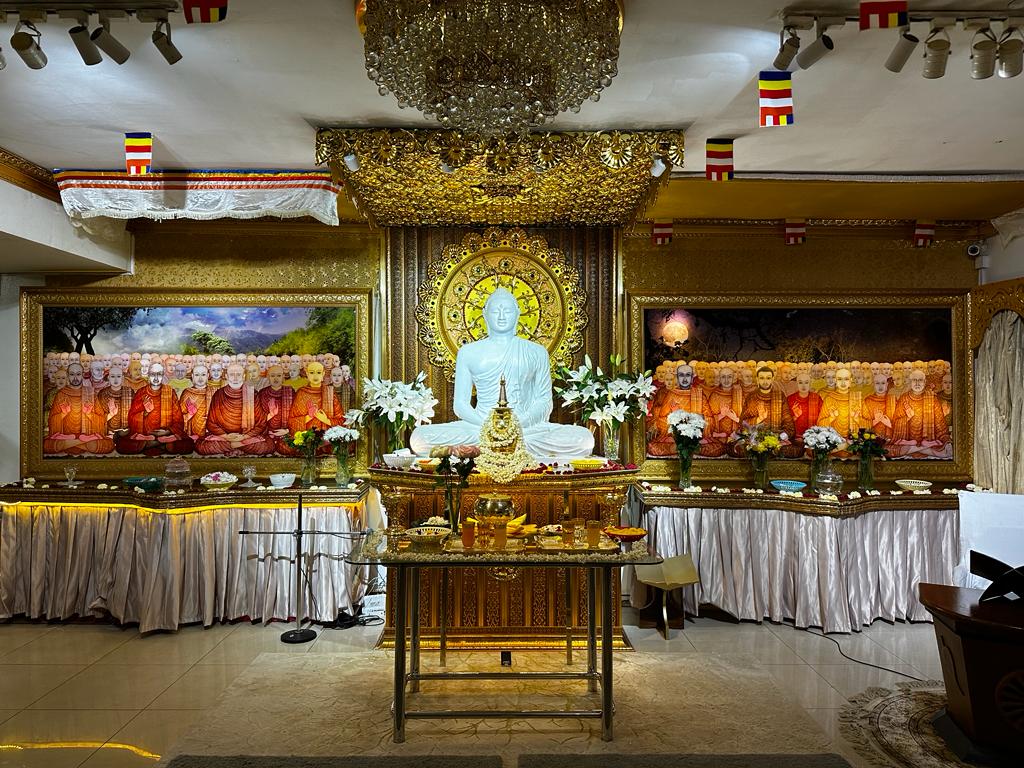
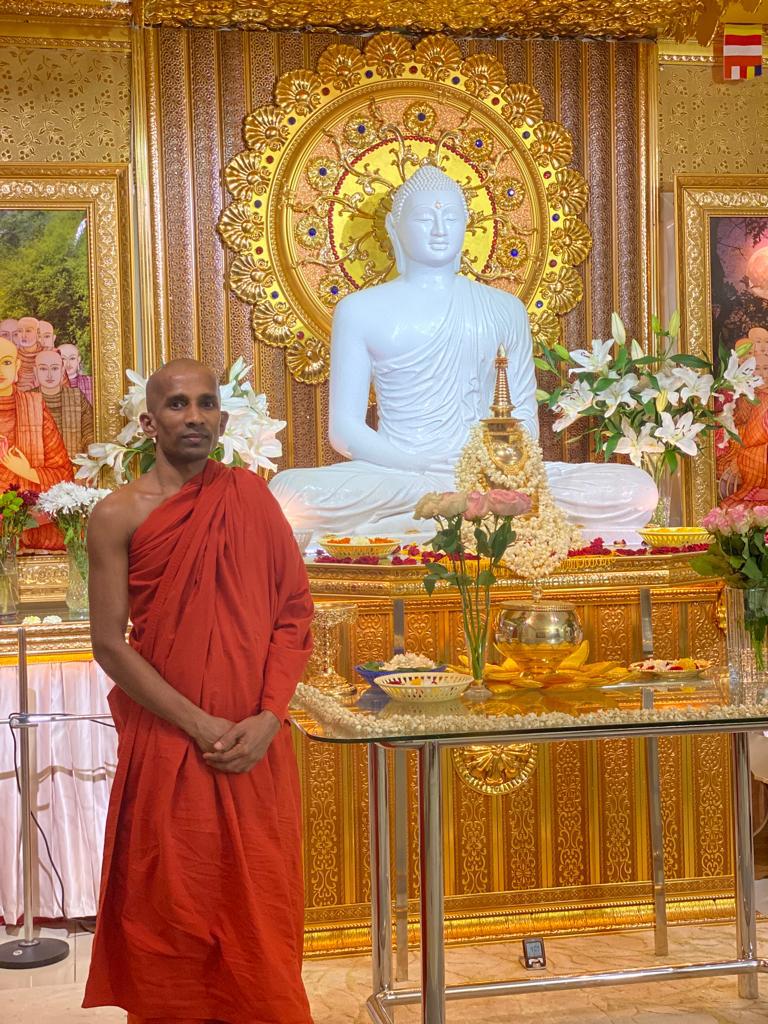
Although his own rotation started only a few months ago, Muditha Vihari Thero has a strong grasp on the needs of Buddhist visitors from around the world. Devotees come from countries such as India, Nepal, Thailand, China, Bangladesh, Japan, Myanmar, Vietnam, Indonesia, Taiwan, the Philippines, the US, New Zealand, Argentina, Brazil, Mexico, and the UK. “The outer trappings may be Sri Lankan, but any Buddhist or any nationality can come here,” he told me. He sees guests from across the globe: when I arrived to my session with him, he was just finishing an audience with two Indian visitors. The Buddhist monasteries, in other words, are for all practitioners.
“We were once only open at particular times of the day, or on certain days,” he continued. “But thanks to the forethought and far-sightedness of the government, we can now do so much more, and we are open basically every day now. The Mahamevnawa monastery hosts a Buddha Wandanawa every evening from 7 p.m. to 8:30 p.m., and the offering of alms to the Buddha and the monks takes place early in the morning and before noon. Alongside this, meditation also takes place regularly throughout the day. The UAE appreciates that Buddhism is part of the culture of so many that come to work, live, and prosper here in Dubai and elsewhere.”
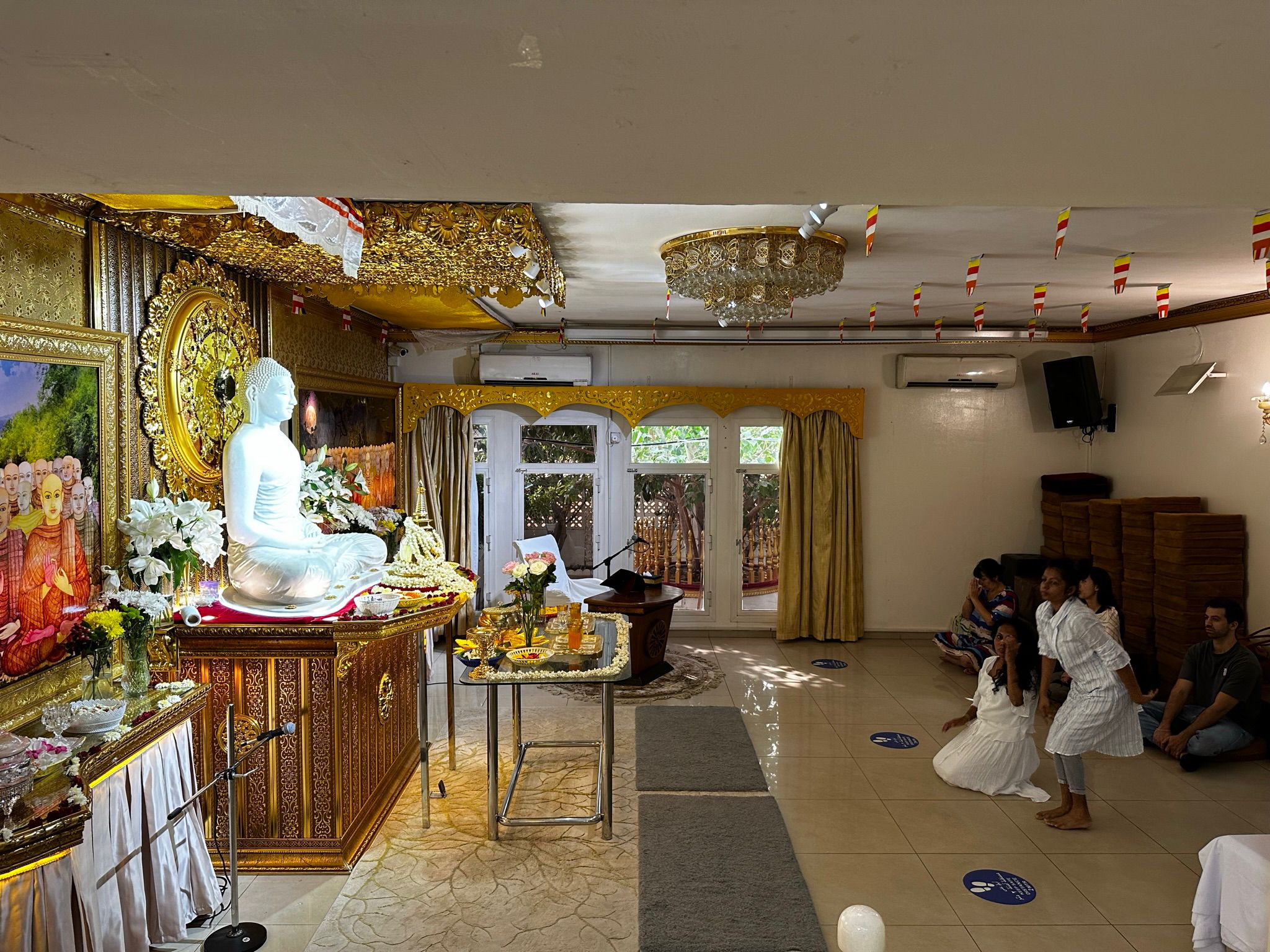
In touring the monasteries, holding interviews with the abbots, and getting a feel of the mood and devotees, it became clear to me that both locations were deeply and authentically welcoming. They are able to serve as sanctuaries for Buddhists thanks to the compassion and tolerance of the UAE government. They also pay great attention to offering a comfortable and spiritually conducive atmosphere. Their respective main hall shrines, which will be decorated on dates of Sri Lankan festivities, testify to the attentiveness by their designers.
That both temples are seeking to include all Buddhists under their “tent” – regardless of denomination or school – reflects the empowerment both institutions have felt with the support of Dubai’s Community Development Authority (CDA). In the case of Lankaramaya, the CDA worked with SAHANA, or the Sri Lankan Welfare Association, to approve a private residence to serve as the grounds for Lankaramaya (Mahamevnawa was also founded in the grounds of a villa). It also reflects an ecumenical attitude that aligns with the principles outlined in the Year of Tolerance in 2019.
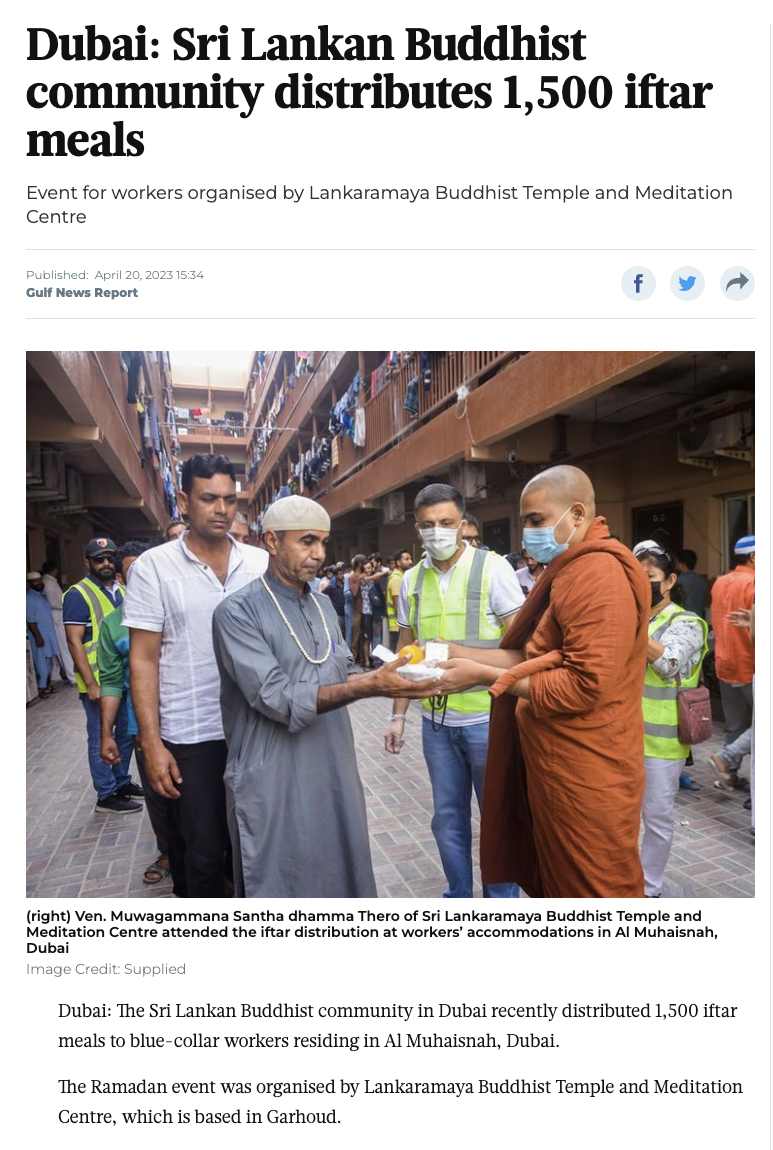
Buddhist communities are meeting the goodwill outlined in the Year of Tolerance with interfaith initiatives of their own. During Iftar on 21 April 2023, Lankaramaya shared over 1,500 meals with workers at Al Muhaisanah. This was an important bridge that the temple built to contribute to a joint effort toward nurturing giving and social harmony: two values that the government shares.
Speaking of harmony, there are two ways to understand Sheik Mohammed’s foresight. The first is envisioning the UAE as a great house, in which the tradition of Islam occupies the master bedroom. Yet in this house are many rooms where the occupants can operate freely within their private domain. The second is as a diamond, which must be cut in many directions to reveal its shine. Yet cutting one angle could well diminish another side, even unintentionally, and so a surgical and balanced approach is required. The “sides” of this cutting, to stretch the image of a modern emirate a bit further, are those of culture, art, sports, religion, and the economy: all of which serve to boost the cause of globalization in a country that already leads the whole region in most ways.
Whether one envisions the UAE as a home for many, or as a diamond shining in the desert, Buddhism is increasingly playing a productive presence here, and will unequivocally make the home warmer, or the gem brighter.
See more
Year of Tolerance: Upholding the UAE’s status as a global capital for tolerance
Related blog posts from BDG
Diamond in the Desert: Buddhism in the United Arab Emirates


